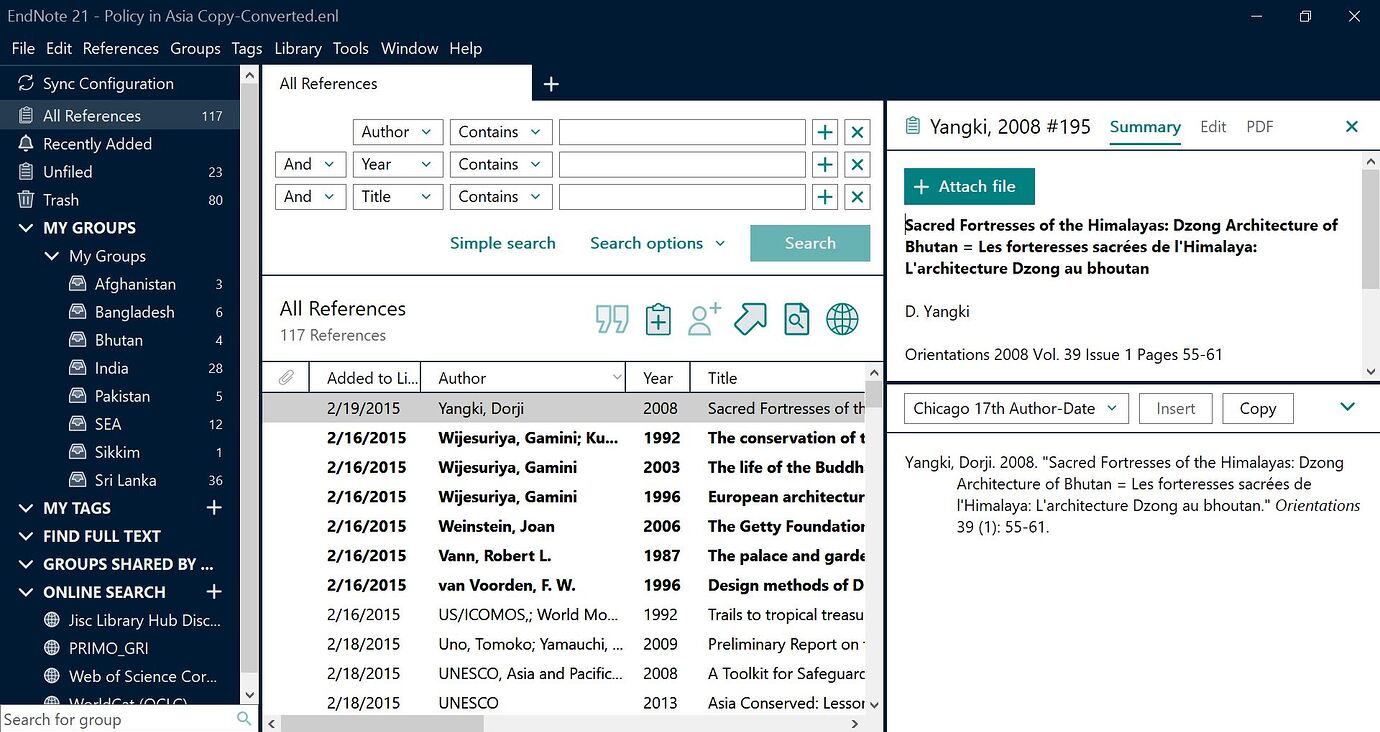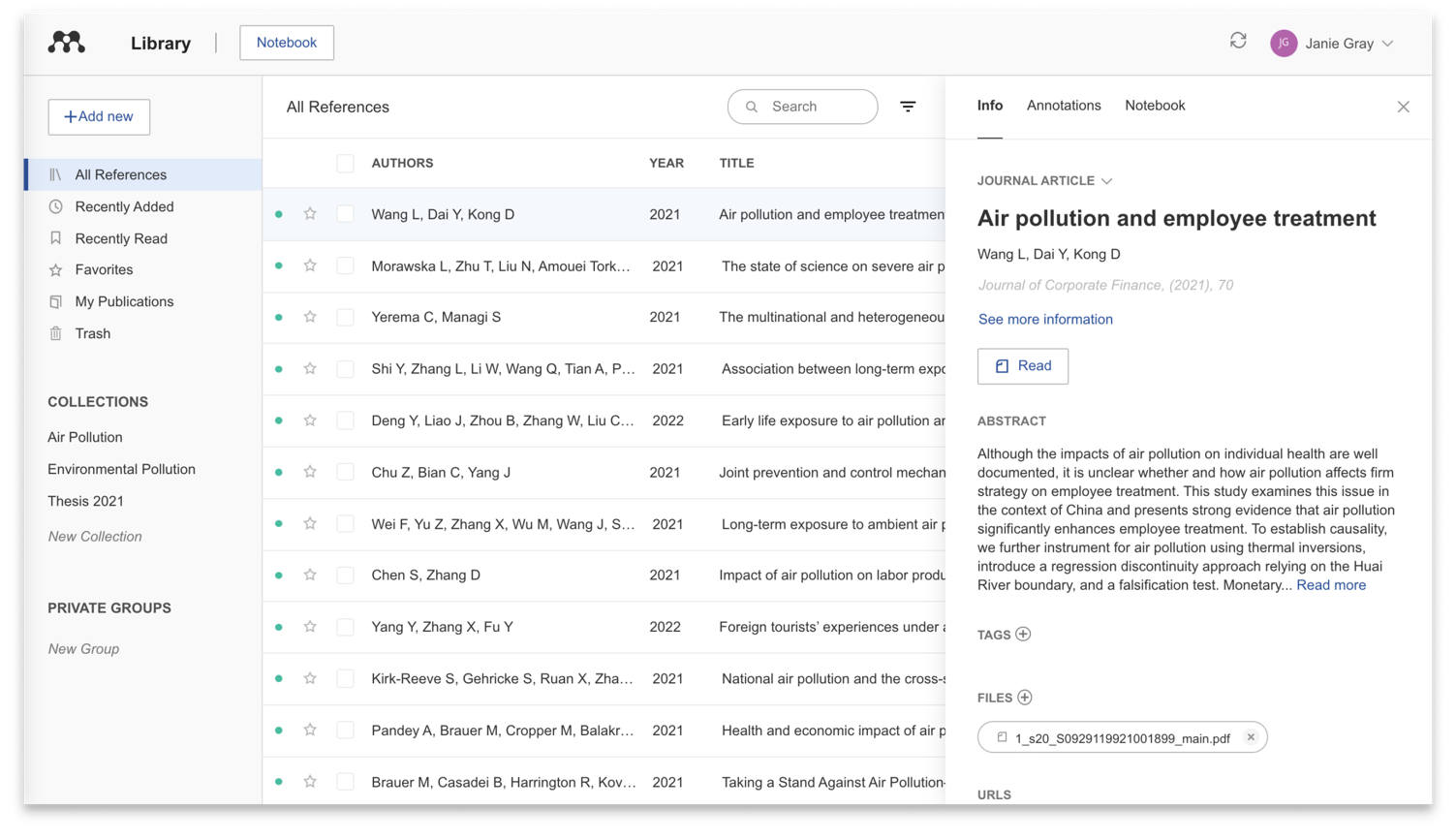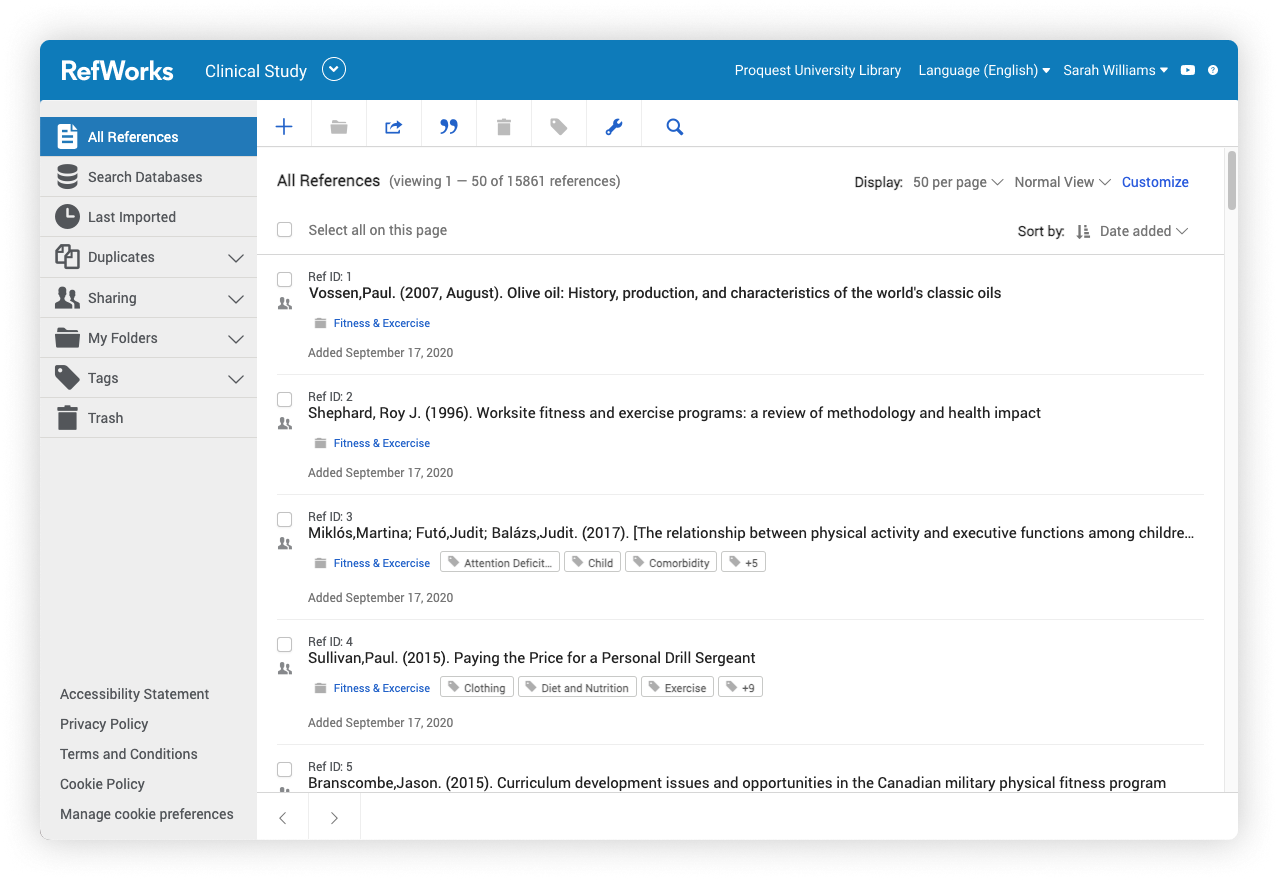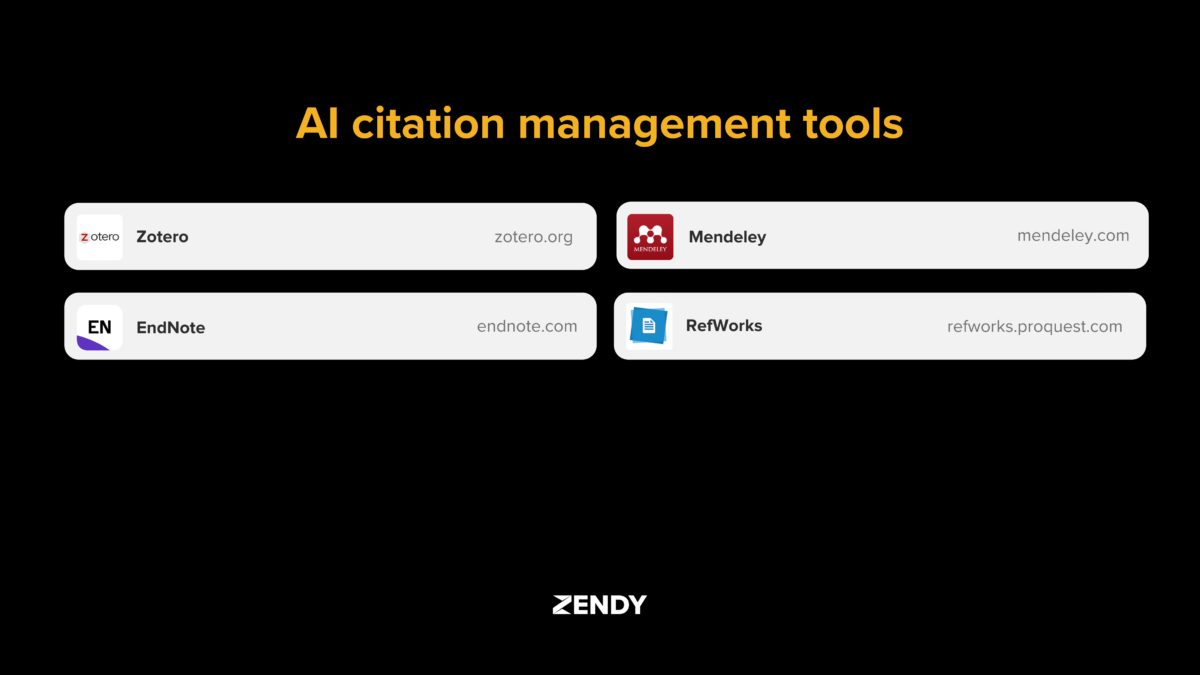
AI is now being built into some of these tools. These citation management tools are designed to help you with tasks like sorting references, checking for errors, or suggesting relevant sources.
This article explains how citation management works, what challenges it addresses, and how AI is being used in tools like Zotero, EndNote, Mendeley, and RefWorks.
What is citation management and why is it important
Citation management is the process of collecting, organising, and formatting reference information used in academic writing. A reference manager is software that helps with this process by storing citation details and generating bibliographies in different styles.
Writing citations by hand takes time and can lead to mistakes. Formatting errors, missing information, or inconsistent styles are common when done manually.
Citation management tools reduce these errors by automating formatting and organising references into folders or collections. Many of these tools also allow users to import references directly from academic databases.
AI is now improving citation management in several ways:
- Automation: AI can detect duplicate entries and organise references automatically
- Extraction: It can pull citation information from PDFs and websites
- Suggestions: Some tools recommend related research based on your existing library
Comparing Zotero, EndNote, Mendeley, and RefWorks
These four citation management tools help you collect, organise, and cite research sources, but they are built for different users and needs.
Zotero is free, open-source software popular with students and independent researchers. EndNote is often used by institutions and professional researchers working with large reference collections. Mendeley combines reference management with academic networking features. RefWorks is a cloud-based tool designed for institutional use.
| Tool | Cost | Platform | Storage |
| Zotero | Free (basic) | Windows, Mac, Linux | 300MB free |
| EndNote | Paid | Windows, Mac | Unlimited (desktop) |
| Mendeley | Free (basic) | Windows, Mac, Web, Mobile | 2GB free |
| RefWorks | Subscription | Web-based | Unlimited with subscription |
Each tool uses AI differently. Zotero supports plugins that add AI features like citation suggestions. EndNote has tools to find full-text PDFs automatically. Mendeley includes AI recommendations for related research. RefWorks uses AI for document organisation.
Essential AI features for modern reference manager tools
AI in reference managers helps automate tasks that would otherwise be time-consuming and error-prone. These features support accuracy in citation formatting, help organise references, and assist with discovering new sources.
1. Automatic metadata extraction
Automatic metadata extraction uses AI to read documents and pull out citation details like author names, titles, and publication dates. This works by scanning PDFs or web pages and identifying citation patterns.
When you add a PDF to your library, the AI analyses the document structure, looking for title pages, author information, and reference sections. It then creates a citation entry with this information.
This feature is especially helpful when you are importing many documents at once. Zotero and Mendeley both excel at metadata extraction, making them popular citation software for Word integration.
2. Recommendation engines for research discovery
Recommendation engines suggest articles related to ones already in your library. These engines analyse your saved references and reading patterns to find similar research.
For example, if your reference manager contains several papers about climate change, the AI might suggest new climate research that cites or is cited by your saved papers.
Mendeley’s recommendation feature examines your library content and suggests related papers from its database of millions of articles. EndNote offers similar functionality through its Web of Science integration.
3. Smart collaboration capabilities
Smart collaboration features help teams manage shared reference libraries. AI helps detect duplicate entries, suggest relevant collaborators, and manage editing conflicts.
For group projects, these features keep shared libraries organised and consistent. When multiple team members add references, AI can identify duplicates even when citation details vary slightly.
RefWorks and Mendeley offer strong collaboration tools. RefWorks allows real-time sharing and editing, while Mendeley lets groups share annotations and organise references together.
Pros and cons of each citation manager
Zotero

Zotero is a free, open-source citation manager developed by a non-profit organisation. It works through a desktop application and browser connector.
Strengths:
- Free to use with basic features
- Strong community support and regular updates
- Excellent at capturing web content and metadata
- Works well with both Word and Google Docs
Limitations:
- Limited storage (300MB) on free accounts
- Fewer built-in AI features compared to commercial options
- Basic collaboration tools
Zotero is ideal for students, independent researchers, and anyone who wants a free, reliable citation manager without complex features.
EndNote

EndNote is a commercial citation manager with advanced formatting capabilities. It’s commonly used in academic and research institutions.
Strengths:
- Powerful formatting options for complex documents
- Strong integration with academic databases
- Comprehensive search capabilities within the tool
- Robust handling of large reference libraries
Limitations:
- Requires purchase (though many institutions provide access)
- Steeper learning curve than other tools
- Less intuitive interface for beginners
EndNote works best for professional researchers, faculty members, and others who need advanced citation features and have institutional support.
Mendeley

Mendeley combines reference management with social networking features. It’s owned by Elsevier, a global leader in advanced information and decision support for science and healthcare.
Strengths:
- Social features to connect with other researchers
- Good PDF annotation and reading tools
- AI-powered article recommendations
- Free basic version with 2GB storage
Limitations:
- Some users have privacy concerns due to Elsevier ownership
- Sync issues reported by some users
- Premium features require subscription
Mendeley is particularly good for researchers who want to discover new content and connect with colleagues while managing their references.
RefWorks

RefWorks is a web-based citation manager typically accessed through institutional subscriptions. It focuses on ease of use and collaboration.
Strengths:
- No software installation required
- Good for team projects and collaboration
- Works on any computer with internet access
- Strong institutional support features
Limitations:
- No free version for individual users
- Fewer customisation options than other tools
- Requires internet connection for most functions
RefWorks is best for students and researchers at institutions with RefWorks subscriptions who need simple, accessible citation management.
Zotero vs EndNote vs Mendeley vs RefWorks: which is best?
The best citation manager depends on your specific needs. There’s no one-size-fits-all answer to the Zotero vs EndNote vs Mendeley vs RefWorks question.
For students and budget-conscious users, Zotero offers the best balance of features and cost. Its free version includes all essential functions, and it’s relatively easy to learn.
For professional researchers working with large libraries, EndNote provides powerful organisation and formatting tools. Its advanced search functions and database integration justify the cost for many users.
For collaborative teams, both Mendeley and RefWorks offer good sharing features. Mendeley adds social networking, while RefWorks focuses on institutional access and ease of use.
When comparing specific tools:
- Zotero vs EndNote: Zotero is free and simpler; EndNote offers more advanced features but costs money
- Zotero vs Mendeley: Zotero has better browser integration; Mendeley offers better PDF reading tools
- EndNote vs Mendeley: EndNote has more formatting options; Mendeley includes social features
- Mendeley vs Zotero: Mendeley offers better recommendations; Zotero has a more open ecosystem
In addition, Zendy works alongside these citation tools by helping users discover and access research content before organising it in their citation manager of choice.
Tips for faster citation software for Word integration
All four major citation managers integrate with Microsoft Word, allowing you to insert citations while writing. This integration saves time and reduces errors.
Installing the plugin
For Zotero, the Word plugin installs automatically with the desktop application. After installation, check Word for a “Zotero” tab in the ribbon.
EndNote’s “Cite While You Write” plugin also installs with the main program. If it doesn’t appear in Word, open EndNote and select “Customize” to enable it.
Mendeley requires downloading “Mendeley Cite” separately from their website. This add-in works with recent versions of Word.
RefWorks uses the “RefWorks Citation Manager” add-in, which can be installed from Word’s Add-ins store.
If a plugin doesn’t appear, try restarting Word or checking that your citation manager is running.
Adding citations to your document
To add citations with Zotero, click the “Add/Edit Citation” button in Word. A search box appears where you can type author names or keywords to find references in your library.
With EndNote, use the “Insert Citation” button, then search your library. You can also insert multiple citations at once.
Mendeley Cite shows a sidebar where you can search your library and click references to insert them.
RefWorks Citation Manager also uses a sidebar approach, with search functionality and citation preview.
All these tools format citations according to your chosen style (APA, MLA, Chicago, etc.) and automatically create a bibliography at the end of your document.
Looking ahead: how AI shapes the future of citation management
AI is changing how researchers manage citations and discover new research. Future developments will likely make these tools even more helpful.
Natural Language Processing (NLP) is improving how citation tools extract information from documents. This means more accurate automatic citations from PDFs and web pages.
AI tools are getting better at suggesting relevant research based on your existing library and reading patterns. This helps researchers discover important work they might otherwise miss.
Some citation tools are beginning to explore integration with generative AI to help summarise articles, identify key citations, and even assist with literature reviews.
Zendy complements these citation managers with AI-powered research discovery and organisation tools. Its features help researchers find relevant content before adding it to their citation libraries.
The best citation managers will continue incorporating AI to make research workflows more efficient while maintaining accuracy and proper attribution.
Frequently asked questions about AI citation management
How do I choose between Zotero, EndNote, Mendeley, and RefWorks?
Consider your budget (Zotero is free, EndNote is paid), collaboration needs (RefWorks and Mendeley excel here), and institutional support (many universities provide EndNote or RefWorks). Try the free version of any tool before committing to see which interface you prefer.
Can I transfer my references between different citation managers?
Yes, most citation managers support exporting and importing references using standard formats like RIS or BibTeX. The transfer usually preserves basic citation information, though some custom notes or organisation may require adjustment.
Which citation manager has the best AI features currently?
Mendeley offers the strongest built-in AI features, particularly for research recommendations. EndNote provides powerful search and organisation tools. Zotero supports AI features through community-developed plugins.
Do citation managers work with Google Docs as well as Microsoft Word?
Zotero and RefWorks have direct Google Docs integration. Mendeley and EndNote have more limited Google Docs support, with EndNote requiring workarounds to use with Google’s platform.
Are the AI features in citation managers difficult to use for beginners?
Most AI features in citation managers work automatically in the background. Features like metadata extraction happen when you add documents, while recommendations appear as suggestions. These require little technical knowledge to use effectively.
